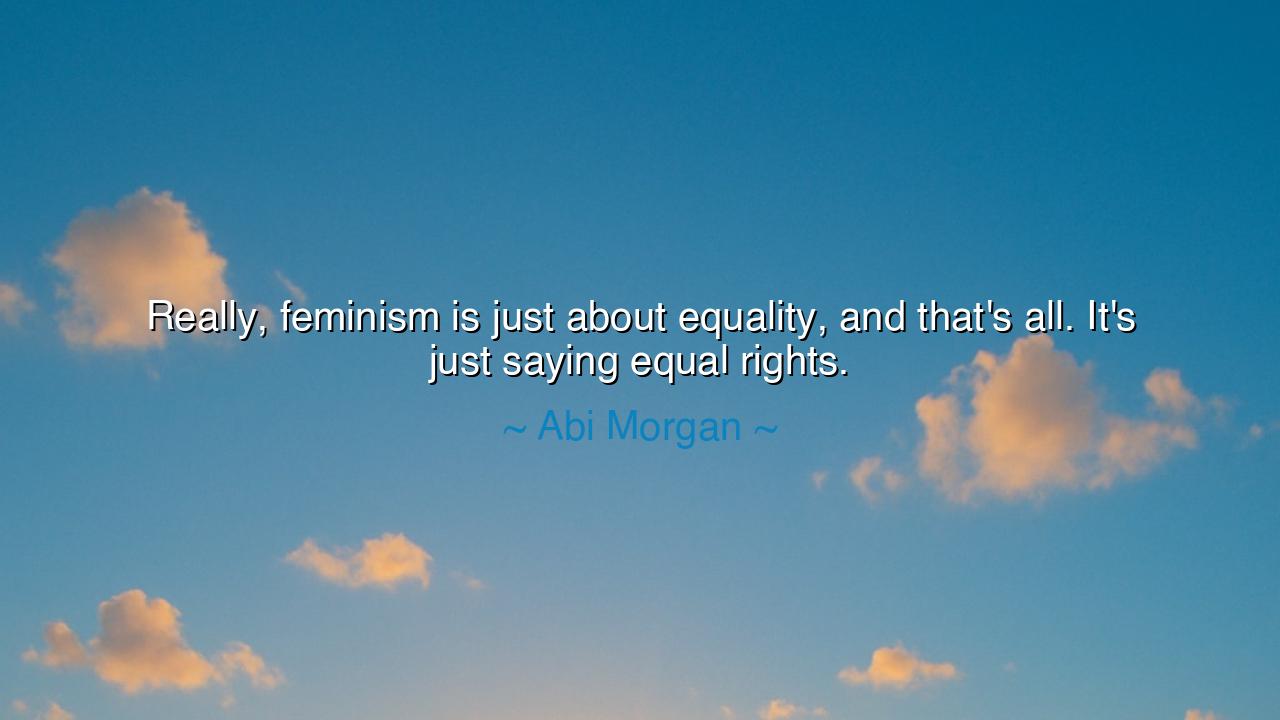
Really, feminism is just about equality, and that's all. It's
Really, feminism is just about equality, and that's all. It's just saying equal rights.






"Really, feminism is just about equality, and that's all. It's just saying equal rights." With these words, Abi Morgan distills the essence of feminism to its most fundamental and pure form: the pursuit of equality. Feminism—often burdened with labels and misinterpretations—at its core, is a simple truth: every human being, regardless of gender, deserves the same rights, the same opportunities, and the same respect. Morgan’s words break down the complexities that have been added to feminism over time, reminding us that it is not a fight for one group over another, but for the inherent dignity and equality of all people.
In the ancient world, the idea of equality was often explored through the lens of virtue and justice. The great philosophers—from Plato to Aristotle—wrestled with questions of justice, often defining it as the fair distribution of rights and responsibilities. Plato, in his Republic, even went so far as to suggest that women could be given the same roles as men in society, as long as their capabilities allowed it. Aristotle, on the other hand, was more conservative, viewing the roles of women as inherently different, and less capable of certain societal duties. Yet, even in these ancient philosophical discussions, the seeds of equality were planted, and the debate over whether men and women should be treated as equals was already a matter of intellectual consideration.
Fast forward to the modern era, and the struggle for gender equality has only intensified. The suffrage movements of the late 19th and early 20th centuries, led by fierce advocates like Susan B. Anthony and Emmeline Pankhurst, fought for the right of women to vote and participate in democratic processes. Their message was simple yet profound: equal rights for all. The victory of women’s suffrage in many countries was not just about the right to vote—it was a recognition that women were entitled to an equal place in society. Similarly, the second wave of feminism in the 1960s and 70s expanded the conversation to equal pay, reproductive rights, and the dismantling of traditional gender roles. Through these movements, feminism became a global call for justice, rooted in the belief that equality is not just a concept, but a right that should belong to all.
Consider the example of Malala Yousafzai, a young woman who defied the oppression of the Taliban and fought for girls' education. Despite being shot for her efforts, Malala’s courage did not falter. She became a global symbol of the fight for equality—not just for girls’ education, but for the fundamental right of every human to pursue their dreams and their potential. Malala’s story reflects the core of feminism as Morgan describes it: the right to equality, the right to be heard, and the right to live free from oppression. Her victory over adversity was not about elevating one group over another, but about ensuring that all people—regardless of gender—have the same rights and opportunities to succeed.
Feminism, then, is not an ideology seeking to overthrow men, but a call to restore justice where inequality exists. It asks that we examine society—how it has been structured—and whether it fairly distributes rights and opportunities. Morgan’s definition of feminism as "just saying equal rights" is a reminder that the fight is not about dividing, but about uniting in the belief that equality strengthens society, and injustice weakens it. It is a moral stance, grounded in the fundamental belief that all people deserve the right to pursue happiness, education, work, and love on an equal footing.
The lesson we must take from Abi Morgan’s words is that the fight for equality is a universal one, and it is not a battle of men against women, but a fight for a more just and balanced society. In our own lives, we must strive to live by these principles, ensuring that we treat everyone around us with the same respect and offer equal opportunities to all, regardless of gender. Whether in our workplaces, homes, or communities, we should be champions of equality, not because it benefits one group more than another, but because it benefits humanity as a whole. Feminism, as Morgan so simply yet profoundly reminds us, is about justice—the recognition that all people deserve to be treated with fairness and dignity.
Let us now take action in the spirit of equality that Abi Morgan and the great advocates for gender equality have laid before us. Let us work to break down the barriers that divide us, not by striving to be the dominant force, but by uplifting all people to a place of equality. Let us support the rights of women, men, and all marginalized groups, knowing that when we stand for equality, we stand for the very best of what humanity can be. Equality is not just a battle of the past—it is a moral imperative for the present and the future. Let us honor it with every word we speak and every action we take.






AAdministratorAdministrator
Welcome, honored guests. Please leave a comment, we will respond soon